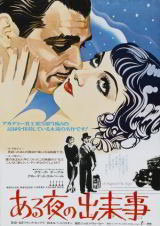 Following the discussion that our Akira Kurosawa Film Club started last month on One Wonderful Sunday, we will now be moving onto the 1934 Frank Capra film It Happened One Night. This does not mean that discussion of One Wonderful Sunday should end of course, as we have specifically chosen It Happened One Night as a companion piece for the Kurosawa film.
Following the discussion that our Akira Kurosawa Film Club started last month on One Wonderful Sunday, we will now be moving onto the 1934 Frank Capra film It Happened One Night. This does not mean that discussion of One Wonderful Sunday should end of course, as we have specifically chosen It Happened One Night as a companion piece for the Kurosawa film.
It Happened One Night stars Clark Gable and Claudette Colbert in a screwball comedy about a rich man’s daughter (Colbert) and a handsome, direct but well-meaning reporter (Gable). Although it was initially seen as a failure, the film proved a major sleeper hit, and went on to win five Academy Awards: Best Film, Best Director, Best Actor, Best Actress and Best Adaptation. It was the first ever film to carry home the “Big Five”, and reportedly also the first film to really popularise the screwball comedy genre on the silver screen.
Nevertheless, when you first watch It Happened One Night, you may wonder why on earth it is on our viewing list. This is actually a valid question. The film was chosen based on remarks in Richie and Galbraith, who list it as one of the works that influenced One Wonderful Sunday. (Galbraith, 90; Richie, 45) Yet, while there are certain basic similarities between the two films, it could be argued that they are fundamentally very different works.
The interesting question then is, why It Happened One Night, together with works such as Capra’s Lady for a Day and Mr Deeds Goes to Town or films by F.W. Murnau, Josef von Sternberg, Henry Koster or D. W. Griffith have been listed as influential to One Wonderful Sunday. How did they influence One Wonderful Sunday, and perhaps even more interestingly, how have they influenced the way that critics have approached Kurosawa’s film?
This would also be a good place to discuss Kurosawa’s influences in general, and the influence of Frank Capra in particular. Kurosawa’s stock answer for the question about his favourite directors was “Ford, Wyler and Capra” (Richie, 45), although as Richie points out, this answer may especially later on have been used more out of a habit than anything else. Yet, Richie goes on to note that Kurosawa was strongly influenced by Capra at the time of his first postwar films. Where does that influence manifest?
Whatever its connection with One Wonderful Sunday, It Happened One Night is of course an enjoyable film in itself. How do you think it compares with other works of its time, and how has it aged in your eyes?
It Happened One Night should be easy to acquire on home video, so check out your usual stores and rentals.
Next month, the Akira Kurosawa Film Club will be moving onto Drunken Angel. For a full schedule, see the film club page.






I managed to watch this over the weekend, and its terrific! Its very entertaining. So sad that we see so few films like this made nowadays – short, razor sharp and funny, with great technique used for the sake of the story, not to make the film makers look good. Gable was a revelation in it to me, I’ve always thought of him as only playing rich smoothies…. judging from this, he could do a lot more, his comic timing was great.
I think that it stands up very well over time. I remember many years ago having watched one of the Thin Man films wondering why it is that so many of the sophisticated films of the 1930’s can seem so modern and ageless, while much more recent films seem to date horribly just a few years after they were made. I would guess it is related to the need for films like this to use top class dialogue and wit over cinematic technique.
One thing I found interesting about the film was the way it dealt with the poverty of rural America at the time, and how it avoided sentimentalizing it. I’m no expert on screwball comedy, but I think the best of this genre of the time are among the greatest films ever made – a personal favorite of mine is His Girl Friday. I think this film stands up very well to the best of the genre, and I suppose as the ‘original’ screwball comedy, it has to be considered one of the most influential films ever made.
I’m a bit more skeptical though as to whether it really is an influence on Kurosawa, except in the most generic sense. I’ll have a think on this and post something on it later.